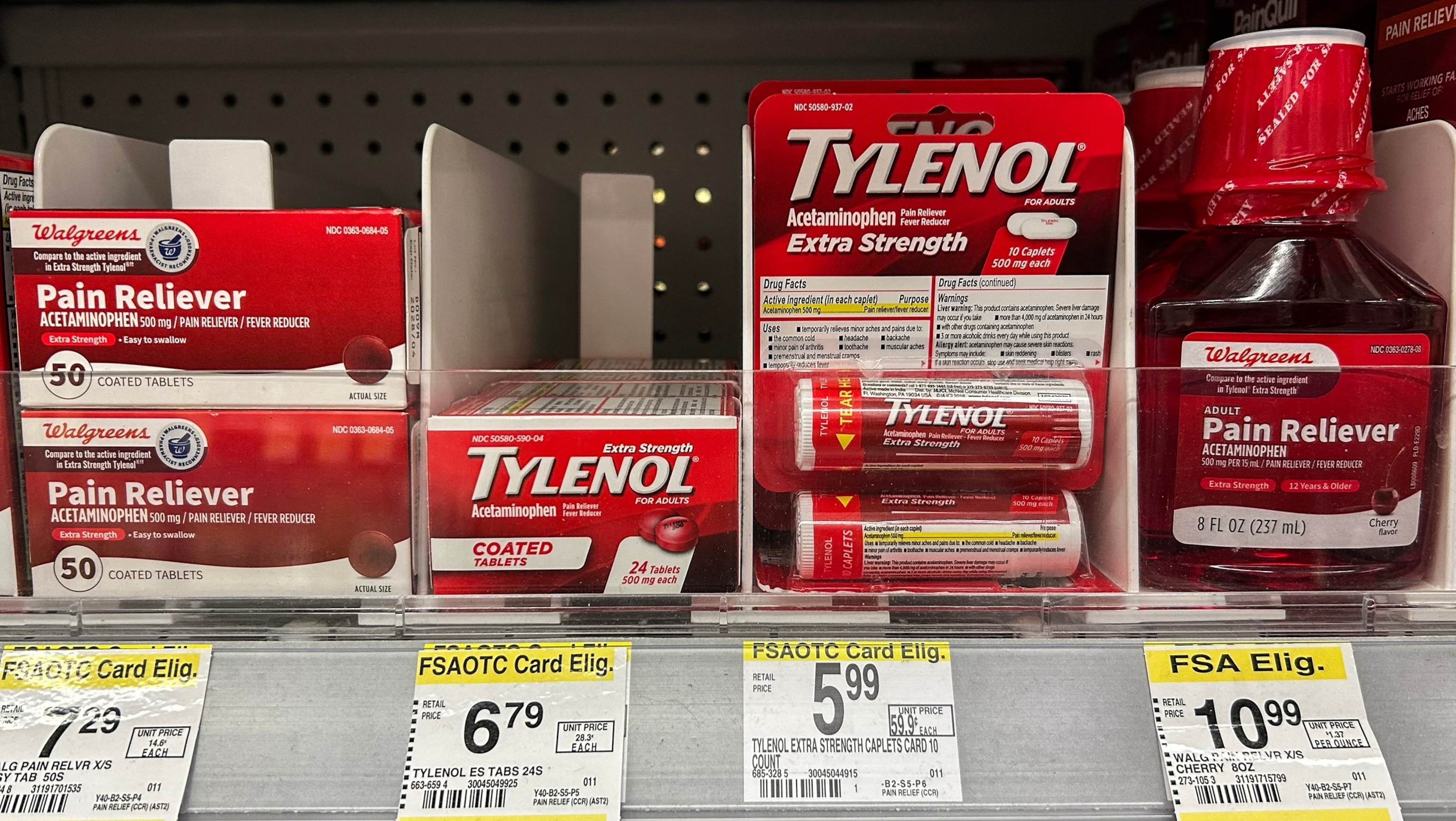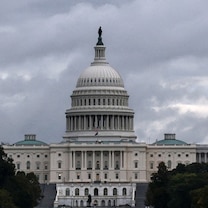Debunking 3 Claims About Tylenol After White House Links Drug Use In Pregnancy To Autism

Since President Donald Trump announced at a White House news conference three weeks ago that pregnant women's use of Tylenol might raise the risk of autism in their children, claims about the drug have been circulating online.
In a Cabinet meeting last week, Trump repeated claims that autism rates are low in some groups, including the Amish community, because they don't take medications or get vaccinated.
Additionally, the president repeated a claim he made on social media that young children, including babies, shouldn't be given Tylenol without providing evidence to back up the statement.
Unverified claims have also been spreading that pregnant women are ingesting toxic amounts of the drug to make a point to the administration.
Doctors told ABC News these claims have been debunked before and that continuing to circulate misinformation and disinformation can be dangerous.
"I empathize with people who are turning on the TV, listening to the radio, or scrolling through their phone, and they're like, 'Oh my gosh, is acetaminophen safe? Is it not?'" said Dr. Alok Patel, a pediatrician at Stanford Children's Health and an ABC News contributor. "I get it. At the end of the day. Take a deep breath. Look at the science and talk to your doctor or health care professional. We will guide you through it."
In response to a request for comment, a Department of Health and Human Services spokesperson referred ABC News to a post Health Secretary Robert F. Kennedy Jr. wrote on X, accusing the media of attacking him "for something I didn’t say in order to distract from the truth of what I did."
Claim: Amish children don't have autism because they don't take acetaminophen
During the September news conference at the White House, claims were made about the prevalence of autism within the Amish community.
"I think I can say that there are certain groups of people that don't take vaccines and don't take any pills, that have no autism," Trump said.
After Kennedy referenced the Amish, Trump continued, "The Amish. Yeah, virtually -- I heard none ... You have certain groups, the Amish as an example. They have essentially no autism."
Later, Trump repeated the claim, saying, "It doesn't exist with the Amish community, and they don't take all of this junk. It doesn't exist."
Dr. Alan Shuldiner, a professor at the University of Maryland School of Medicine -- who has studied the Amish population in Lancaster, Pennsylvania, for decades -- said there have been very few systematic studies of autism in the Amish community.
One of the only reports, an abstract from researchers at the University of Miami and Vanderbilt University that was published in 2010 and presented at an international meeting for autism research, looked at autism among the Amish from Indiana and Ohio.
Researchers estimated that autism in these Amish communities among children was about one in 271, which is lower than the 2022 rate in the U.S. among the general population of one in 31.
"It's really hard to compare prevalence rates," Schuldiner told ABC News. "One in 271 is the number they got, but the methods that are used to estimate the prevalence of autism in the general population are quite different, and use of physicians and health care workers in the two communities are different."
"I would be hesitant to compare the one to 271 to any estimate in the general population," he continued.
Dr. Jeremy Veenstra-VanderWeele, division director in child and adolescent psychiatry at Columbia University, told ABC News that genetic conditions may also contribute to the prevalence of autism among Amish populations.
For example, mutations in the CNTNAP2 gene, which plays a role in the development and function of the nervous system, have been linked to a predisposition of autism, particularly among some Amish children.

"There are genetic conditions that include autism, that are actually more common in the Amish population, including a variant in the CNTNAP2, which has been extensively characterized and is associated with autism and epilepsy," he said. "It's essentially exclusively seen in the Amish community as one example of how the current administration is tremendously misinformed and has not read the medical literature."
Experts said there is also no evidence to suggest Amish people don't use generic acetaminophen, or Tylenol, as there are no current studies solely examining Tylenol use in the Amish.
"In terms of Tylenol, I can authoritatively say that the Amish definitely use Tylenol," Schuldiner told ABC News. "In studying 10,000 Amish over 30 years, we asked the vast majority of them, 'What medications do they take?' and certainly Tylenol is among the list of things that Amish do take."
He went on, "It's hard to compare whether they use more Tylenol or less Tylenol than the general population, but I can certainly comment that they do use Tylenol."
Claim: Pregnant women are taking unhealthy doses of Tylenol
Rumors have been swirling on social media that there is an increase in pregnant women taking unhealthy doses of acetaminophen to spite the Trump administration after its announcement that use of the drug during pregnancy may be linked to autism.
During the Cabinet meeting on Friday, Kennedy said he was shown a video on TikTok of an eight-month pregnant woman who cursed at Trump and was "gobbling" Tylenol.
Another unverified claim from the founder of American Frontline Nurses, a group that spread misinformation during the COVID-19 pandemic, stated a pregnant woman took excessive amounts of Tylenol to prove the drug doesn't cause autism after Trump's White House announcement and subsequently needed ICU care.
Acetaminophen can be toxic when ingested in larger doses than recommended, with symptoms, including abdominal pain, upset stomach, diarrhea, nausea, vomiting and even seizures. Treatment received within eight hours of an overdose can increase the odds of recovery, according to the National Library of Medicine.
Doctors who spoke to ABC News said they have not seen any confirmed accounts, or uptick, of women taking acetaminophen in high doses to make a statement.
"We don't have any evidence to suggest that pregnant women are taking excessive amounts of Tylenol, to spite the current administration, or to make some type of grand statement about the proposed safety of Tylenol," Patel told ABC News.
Patel said he has seen videos of pregnant women advocating that Tylenol be used in certain situations, such as for pain or fever.

"Some women have taken to social media to say, 'Hey, I'm pregnant, and I am going to safely take Tylenol,'" he said. "And it's important to note that pregnant women have also stated that they're only going to take the smallest dose for the shortest interval to treat their pain or their symptoms."
Patel added that Tylenol is the safest medication to take during pregnancy to treat pain and fever, and is safer than other medications, including ibuprofen or aspirin, both of which can increase the risk of complications for both the mother and the fetus.
Claim: Young children shouldn't take Tylenol
Aside from advising pregnant women not to take acetaminophen due to an alleged risk of autism, Trump also advised parents not to give the medication to their children.
"Don't give Tylenol to your young child for virtually any reason." Trump wrote in a social media post in September.
Trump repeated the advice during a Cabinet meeting, stating that after a baby is born, "don't give Tylenol, if you can avoid it at all, just don't give it Tylenol."
A post on Tylenol's website recommends that children take the product only with age- and weight-appropriate dosing, following the instructions on the label or a doctor's guidance.
The American Academy of Pediatrics and other medical groups say acetaminophen is safe for children when used correctly and there are no studies linking its use in children to autism.
Patel said that, while doctors would like to keep the number of medications potentially given to newborns or babies low, there are certain situations in which it may be helpful.
"There are certain situations when young babies have elevated temperatures, they have fevers, or they're in pain, and this is affecting sleep, this is affecting their ability to eat," Patel said. "They might be getting dehydrated, and in these situations, it is actually the safer option to give these babies Tylenol."
Patel said it's important to make sure parents are giving their children a safe weight-based dose, or the smallest amount that the child needs for the shortest amount of time.
During the Cabinet meeting, Kennedy claimed children who are circumcised have higher rates of autism, adding it's highly likely because they're given Tylenol." Kennedy referenced "two studies," but didn't specify which studies.

A 2015 Danish study found a bump in autism diagnoses among circumcised boys, particularly in those younger than age 5, but the authors say the results do not prove causation. The study also did not mention Tylenol, acetaminophen or any pain medications, according to a post from public health scientist Jessica Steier.
Another 2013 ecological analysis found a correlation in autism prevalence in males and a country's circumcision rate. Although the authors state the data did not provide "strong evidence of causality."
"We do know that high fevers [in children are associated with a number of problems and can be associated with seizures can be associated with other complications," Veenstra-VanderWeele said. "And so, parents of young children should have conversations with their children's doctor about under what circumstances it makes sense to use Tylenol or other medications to treat fever or pain."
Popular Products
-
 Ashwagandha & Black Cumin Seed Oil
Ashwagandha & Black Cumin Seed Oil$43.56$21.78 -
 Shilajit Capsules for Strength & Vita...
Shilajit Capsules for Strength & Vita...$43.99$29.78 -
 Pre-Workout Supplement for Strength, ...
Pre-Workout Supplement for Strength, ...$43.99$29.78 -
 Centrum Multivitamin for Energy, Immu...
Centrum Multivitamin for Energy, Immu...$43.99$25.78 -
 Bee Venom Capsules for Joint Support ...
Bee Venom Capsules for Joint Support ...$43.56$21.78


